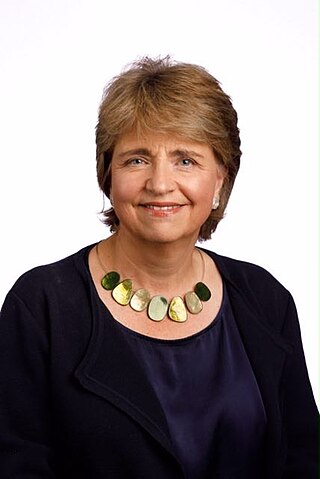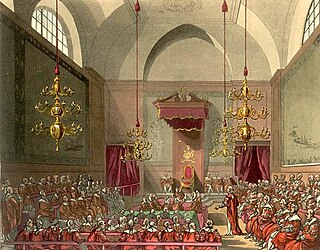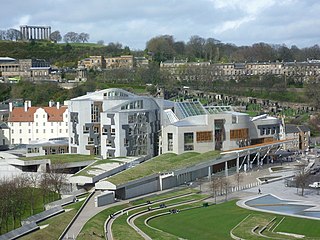Politics in Estonia takes place in a framework of a parliamentary representative democratic republic, whereby the Prime Minister of Estonia is the head of government, and of a multi-party system. Legislative power is vested in the Estonian parliament. Executive power is exercised by the government, which is led by the prime minister. The judiciary is independent of the executive and the legislature. Estonia is a member of the United Nations, the European Union, and NATO.

The European Commission (EC) is part of the executive of the European Union (EU). It operates as a cabinet government, with 27 members of the Commission headed by a President. It includes an administrative body of about 32,000 European civil servants. The commission is divided into departments known as Directorates-General (DGs) that can be likened to departments or ministries each headed by a Director-General who is responsible to a Commissioner.

The Civil Service is the permanent bureaucracy or secretariat of Crown employees that supports His Majesty's Government, which is led by a cabinet of ministers chosen by the prime minister of the United Kingdom of Great Britain and Northern Ireland.

Sir Donald Tsang Yam-kuen is a former Hong Kong civil servant who served as the second Chief Executive of Hong Kong from 2005 to 2012.

Wendy Alexander is a retired Scottish politician and the former Member of the Scottish Parliament (MSP) for Paisley North. She held various Scottish Government cabinet posts and was the Leader of the Labour Party in Scotland from 2007 to 2008. In 2010–2011 she convened the Scotland Bill Committee on financial powers of the Scottish Parliament.

The Congressional Budget Office (CBO) is a federal agency within the legislative branch of the United States government that provides budget and economic information to Congress. Inspired by California's Legislative Analyst's Office that manages the state budget in a strictly nonpartisan fashion, the CBO was created as a nonpartisan agency by the Congressional Budget and Impoundment Control Act of 1974.

John Norman McKay is a Canadian lawyer and politician. He is the Liberal Member of Parliament for the riding of Scarborough-Guildwood. McKay was Parliamentary Secretary to the Minister of Finance from 2003 to 2006 during the government of Paul Martin, then served as an opposition MP and critic until November 2015 during the government of Stephen Harper. As of April, 2019, he serves as Chair of the Standing Committee on Public Safety and National Security; Chair of the Canadian Section of the Canada-United States Permanent Joint Board on Defence; Chair of the Canada-United Kingdom Inter-Parliamentary Association, Vice-chair of the Canada-United States Inter-Parliamentary Group, and Counsellor Canadian NATO Parliamentary Association.

The Office of Government Commerce (OGC) was a UK Government Office established as part of HM Treasury in 2000. It was moved into the Efficiency and Reform Group of the Cabinet Office in 2010, before being closed in 2011.
Evidence-based policy is a concept in public policy that advocates for policy decisions to be grounded on, or influenced by, rigorously established objective evidence. This concept presents a stark contrast to policymaking predicated on ideology, 'common sense,' anecdotes, or personal intuitions. The methodology employed in evidence-based policy often includes comprehensive research methods such as randomized controlled trials (RCT). Good data, analytical skills, and political support to the use of scientific information are typically seen as the crucial elements of an evidence-based approach.

The reform of the House of Lords, the upper house of the Parliament of the United Kingdom, has been a topic of discussion in UK politics for more than a century. Multiple governments have attempted reform, beginning with the introduction of the Parliament Act 1911 by the incumbent Liberal Government, which stated:
...whereas it is intended to substitute for the House of Lords as it at present exists a Second Chamber constituted on a popular instead of hereditary basis, but such substitution cannot be immediately brought into operation

The Access to Information Act or Information Act is a Canadian Act providing the right of access to information under the control of a federal government institution. As of 2020, the Act allowed "people who pay $5 to request an array of federal files". Paragraph 2. (1) of the Act ("Purpose") declares that government information should be available to the public, but with necessary exceptions to the right of access that should be limited and specific, and that decisions on the disclosure of government information should be reviewed independently of government. Later paragraphs assign responsibility for this review to an Information Commissioner, who reports directly to parliament rather than the government in power. However, the Act provides the commissioner the power only to recommend rather than compel the release of requested information that the commissioner judges to be not subject to any exception specified in the Act.
The People's Charter for Change, Peace and Progress was a proposed legal document which would have complemented the 1997 Constitution of Fiji. It would have established compulsory guidelines for any government policy in Fiji over the coming years. The People's Charter was due to be completed and come into force prior to the scheduled 2014 general election.
The Joint Ocean Commission Initiative is a bipartisan, collaborative group in the United States that aims to "accelerate the pace of change that results in meaningful ocean policy reform." The Joint Initiative was established by the members of two major U.S.-based oceans commissions: the Pew Oceans Commission and the United States Commission on Ocean Policy. It was originally co-chaired by former White House Chief of Staff Leon Panetta and former Chief of Naval Operations Admiral James D. Watkins, chairs of the Pew and U.S. Ocean Commissions, respectively. Currently, the Joint Initiative is led by a Leadership Council, which is co-chaired by Christine Todd Whitman, former EPA Administrator under President George W. Bush and former governor of New Jersey, and Norman Y. Mineta, Secretary of Commerce under President Bill Clinton and Secretary of Transportation under President George W. Bush.

Devolution is the process in which the central British parliament grants administrative powers to the devolved Scottish Parliament. Prior to the advent of devolution, some had argued for a Scottish Parliament within the United Kingdom – while others have since advocated for complete independence. The people of Scotland first got the opportunity to vote in a referendum on proposals for devolution in 1979 and, although a majority of those voting voted 'Yes', the referendum legislation also required 40% of the electorate to vote 'Yes' for the plans to be enacted and this was not achieved. A second referendum opportunity in 1997, this time on a strong proposal, resulted in an overwhelming 'Yes' victory, leading to the Scotland Act 1998 being passed and the Scottish Parliament being established in 1999.
The Independent Payment Advisory Board (IPAB) was to be a fifteen-member United States government agency created in 2010 by sections 3403 and 10320 of the Patient Protection and Affordable Care Act which was to have the explicit task of achieving specified savings in Medicare without affecting coverage or quality. Under previous and current law, changes to Medicare payment rates and program rules are recommended by MedPAC but require an act of Congress to take effect. The system creating IPAB granted IPAB the authority to make changes to the Medicare program with the Congress being given the power to overrule the agency's decisions through supermajority vote. The Bipartisan Budget Act of 2018 repealed IPAB before it could take effect.

Reform of local government in Northern Ireland saw the replacement of the twenty-six districts created in 1973 with a smaller number of "super districts". The review process began in 2002, with proposals for either seven or eleven districts made before it was suspended in 2010. On 12 March 2012, the Northern Ireland Executive published its programme for government, which included a commitment to reduce the number of councils in Northern Ireland to 11. The first elections to these new councils were on 22 May 2014.

The Constitution of Kenya is the supreme law of the Republic of Kenya. There have been three significant versions of the constitution, with the most recent redraft being enabled in 2010. The constitution was presented to the Attorney General of Kenya on 7 April 2010, officially published on 6 May 2010, and was subjected to a referendum on 4 August 2010. The new Constitution was approved by 67% of Kenyan voters. The constitution was promulgated on 27 August 2010.

Institute of Modern Politics is an independent policy institute based in Sofia, Bulgaria, EU. It is registered under Bulgarian legislation as a public benefit, non-profit foundation. Its team is multidisciplinary and consists of legal practitioners and scholars, social and political science experts, and economists. Its stated mission is to "be a leading source of independent research on legislative and government policies, and based on that research, to promote informed debate and to provide innovative, practical recommendations that advance good governance and human rights in Bulgaria".

In the United Kingdom, devolution is the Parliament of the United Kingdom's statutory granting of a greater level of self-government to the Scottish Parliament, the Senedd, the Northern Ireland Assembly and the London Assembly and to their associated executive bodies: the Scottish Government, the Welsh Government, the Northern Ireland Executive and in England, the Greater London Authority and combined authorities.
The Conference on the Future of Europe was a proposal of the European Commission and the European Parliament, announced at the end of 2019, with the aim of looking at the medium- to long-term future of the EU and what reforms should be made to its policies and institutions. It is intended that the Conference should involve citizens, including a significant role for young people, civil society, and European institutions as equal partners and last for two years. It will be jointly organised by the European Parliament, the EU Council and the European Commission. On 19 April 2021, the multilingual digital platform of the Conference futureu.europa.eu was launched.














